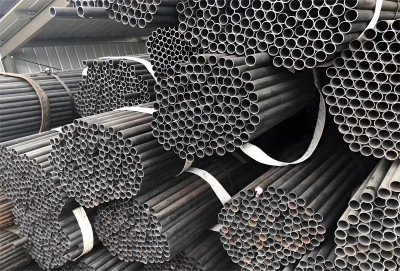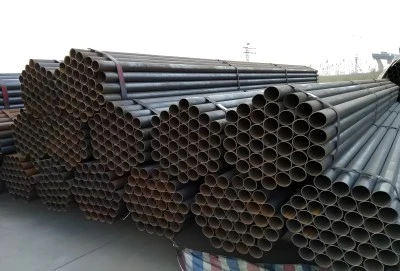Wall Thickness:
Electric Resistance Welded (ERW) pipes are distinguished by their wall thickness, catering to a spectrum of industrial applications. The wall thickness of API 5L ERW pipes is a critical factor in determining their pressure tolerance and structural integrity.
1.Standard Wall (STD):
Standard wall ERW pipes are the workhorses of the industry, offering a balance of cost and performance. With a common wall thickness, they are extensively used for moderate pressure applications such as water supply lines, natural gas distribution, and general construction.
2.Heavy Wall (HVY):
Heavy wall ERW pipes are designed for applications where the pressure demands are high. With a thicker wall, they are often specified for the transportation of oil, natural gas, and other substances under high pressure. These pipes are also favored for their ability to withstand harsh environmental conditions and potential mechanical stress.
3.Light Wall (LT):
Light wall ERW pipes are crafted with a thinner wall thickness, making them lightweight and easy to handle. They are ideal for applications where weight is a concern, such as in the manufacturing of furniture, automotive parts, and lightweight structures. Their reduced wall thickness also makes them cost-effective for certain non-critical applications.
|
|
|
Diameter:
The breadth of API 5L ERW pipes is another separating factor, with sizes ordinarily going from 1/8 inch to 24 inches. Every measurement fills explicit needs and is picked in light of the application's prerequisites.
Little Distance across Lines:
1.Little breadth ERW pipes are much of the time utilized in plumbing, electrical channel, and instrumentation lines. Their more modest size takes into consideration simple establishment and is appropriate for bound spaces.
2.Huge Breadth Lines:
Huge distance across ERW pipes are utilized for underlying scaffolding and high-volume liquid transportation. They are basic in the development of extensions, elevated structures, and in the oil and gas industry for significant distance pipeline projects.
Grade:
The grade of API 5L ERW pipes is indicative of the steel's chemical composition and mechanical properties, which in turn affect the pipe's performance and suitability for various applications.
1.A53 Grade:
A53 is a widely-used grade for ERW pipes, known for its versatility and cost-effectiveness. It is suitable for general-purpose applications where a balance of strength and ductility is required.
2.A106 Grade:
A106 offers higher strength than A53, making it a popular choice for structural applications. It is often used in steam, condensate, and other high-temperature applications where additional strength is needed.
3.API 5L Grade:
API 5L, an internationally recognized standard developed by the American Petroleum Institute (API), stands as a cornerstone in the realm of pipeline construction, particularly within the oil and gas industry. This specialized grade encompasses a diverse range of steel specifications tailored to meet the demanding requirements of transporting hydrocarbons across vast distances and challenging terrains. With grades ranging from B to X80, API 5L exemplifies a commitment to excellence in engineering, ensuring superior performance, durability, and reliability in critical pipeline applications.
At the heart of API 5L lies a dedication to quality and innovation, with each grade meticulously formulated to excel in specific operating conditions. Let's delve into the key attributes and applications of select API 5L grades, highlighting their significance within the industry.
4.API 5L Grade B: As the most commonly used grade in the API 5L lineup, Grade B serves as the foundation for many pipeline projects.
Renowned for its balanced combination of strength, ductility, and weldability, Grade B pipes are well-suited for general-purpose applications, including transmission of natural gas and crude oil in moderate to low-pressure environments.
5.API 5L Grade X42: With enhanced mechanical properties compared to Grade B, X42 is favored for pipelines operating in more demanding conditions. Its higher yield strength and improved weldability make it a preferred choice for applications requiring increased resistance to deformation and stress, such as offshore drilling operations and long-distance transmission lines.
6.API 5L Grade X52: Positioned as a versatile grade offering a superior balance of strength and toughness, X52 finds extensive use in both onshore and offshore pipelines. Its enhanced resistance to cracking and corrosion, coupled with excellent formability and weldability, makes it indispensable for projects where reliability and longevity are paramount concerns.
7.API 5L Grade X65: Stepping into the realm of high-strength steels, X65 represents a significant advancement in pipeline technology. Characterized by its exceptional strength, toughness, and resistance to fracture propagation, X65 is ideally suited for applications in harsh environments, including deepwater drilling and Arctic exploration.
8.API 5L Grade X80: At the pinnacle of the API 5L grade spectrum, X80 embodies the epitome of strength and durability. Engineered to withstand extreme pressures, temperatures, and environmental conditions, X80 pipelines play a vital role in accessing remote and challenging reserves, such as unconventional gas fields and ultra-deepwater reservoirs.
The selection of an appropriate API 5L grade is guided by factors such as operating conditions, environmental considerations, and project specifications. Engineers and operators must carefully evaluate these parameters to ensure the seamless integration of pipelines into the broader infrastructure network, safeguarding the integrity and efficiency of energy transportation systems worldwide.
Beyond their mechanical attributes, API 5L ERW pipes grades adhere to stringent quality control measures throughout the manufacturing process. From raw material sourcing to final inspection, each stage is subject to rigorous testing protocols, including chemical analysis, mechanical testing, and non-destructive examination, to guarantee compliance with API standards and industry regulations.
API 5L grades represent a pinnacle of engineering excellence, providing the backbone for safe, reliable, and efficient energy transportation systems.
With their diverse range of properties and applications, these grades continue to drive innovation and progress in the oil and gas industry, facilitating the exploration, production, and distribution of vital energy resources to meet the world's growing demand.
Wholesale API 5L Grade B ERW Steel Pipe Manufacturers:
Longma Group is a leading manufacturer and supplier of high-quality API 5L ERW pipes. Their product range covers a spectrum of grades from B to X80, meeting the diverse needs of the oil and gas industry. Longma Group's commitment to quality and adherence to international standards make them a reliable choice for API line pipe manufacturers.
Their ERW pipes are manufactured with precision and undergo rigorous testing to ensure compliance with API 5L standards. Whether it's for onshore or offshore applications, Longma Group provides pipes that are designed to perform under the most demanding conditions.
For those seeking a trusted partner in API 5L ERW steel pipe manufacturing, Longma Group stands out with their high-quality products and exceptional customer service. Contact them at info@longma-group.com for all your pipeline needs.














